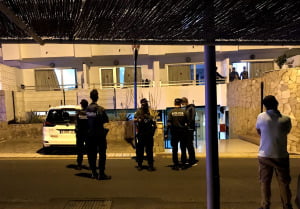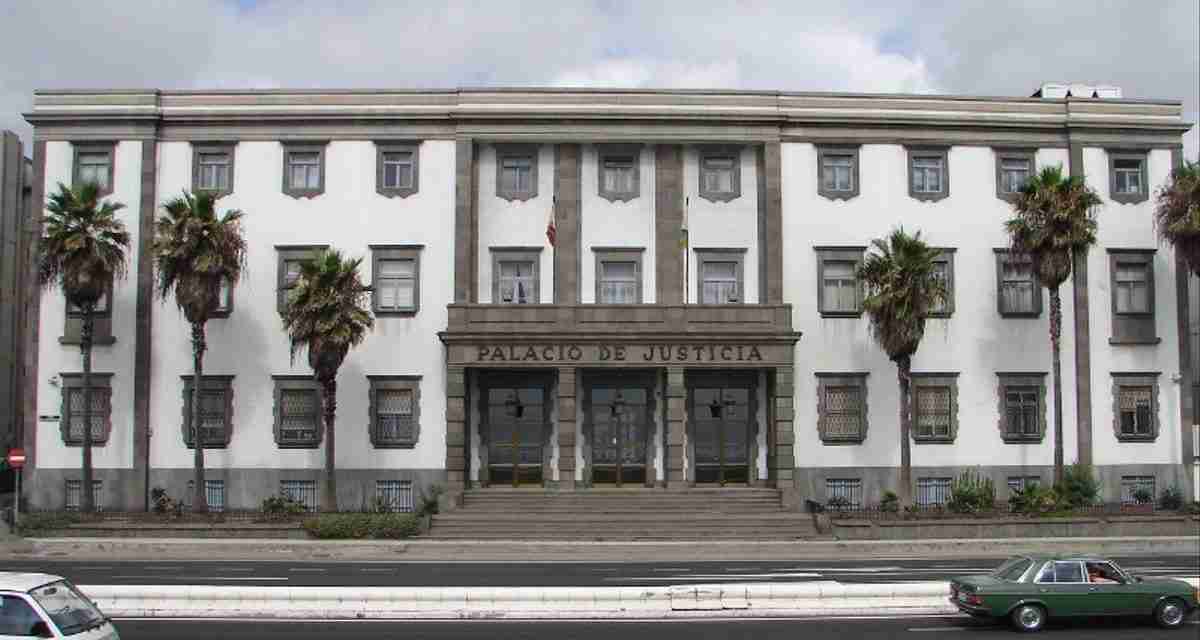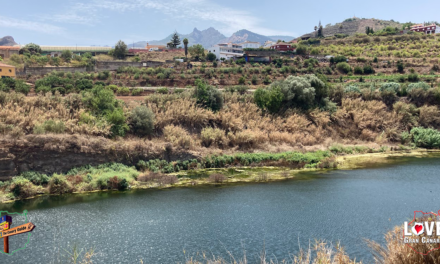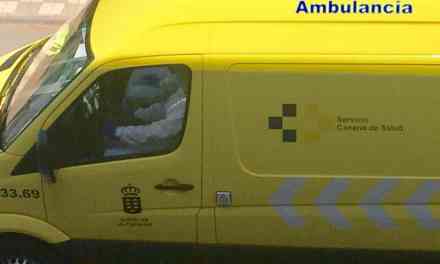A comprehensive analysis conducted by Group I of the Economic and Fiscal Crime Unit (UDEF) of the National Police yielded scandalous results, writes Spanish language daily Canarias7, regarding the alleged irregular use of the public funds intended for the care of unaccompanied minors, by the suspected to have been perpetrated by centres managed by the Foundation Social Response Siglo XXI on Gran Canaria and Lanzarote. In this case, driven by the Anti-Corruption Prosecutor’s Office, investigators discovered that the director of the Guiniguada centre charged the NGO responsible for €1,500 worth of beauty treatments and €1,113 for bills at top restaurants including Vinófilos, El Vasco de Vegueta, and Triciclo.
One of the primary people under investigation is María de los Ángeles Barroso, who, during the previous legislature, served as secretary and treasurer of the executive committee of the ultra-right Vox party in the province of Las Palmas, and during the recent elections appeared as number eight candidate for Unidos por Gran Canaria, for the mayoralty of the capital. Lucas Bravo de Laguna, the president of UxGC, expressed his surprise upon learning about the investigation from the newspapers. “I found out through CANARIAS7,” he said in an interview, adding that “she is simply a party member, and we want to hear her side before taking any action.”
Editor’s comment:It may be worth noting, as an unconnected aside, that María de los Ángeles Barroso was not the first Vox activist to appear on the electoral lists of other political parties in the recent local and regional elections. The names of other Vox players also appeared on lists seemingly and ideologically worlds apart from the ultra-right nationalists, including on the original list for PSOE in the south western municipality of Mogán. Sufficient surprise was generated in at least that instance to cause the candidate in question (Cristo Manuel Santiago Santana number 12 on the list) to stand down, claiming they were only trying to help.
 Barroso, who has a diploma in Social Education, had already been the subject of some controversy after a group of workers accused her of being “racist” due to her alleged behaviour and comments at work at a centre on Lanzarote. Eyebrows were further raised when her political leanings were pointed out after she joined the facilities caring for migrant minors on Gran Canaria. At the time a foundation spokesperson pointed out that her politics and her profession must be treated separately, as her qualifications are in the appropriate field for her appointment in caring for vulnerable migrant children.
Barroso, who has a diploma in Social Education, had already been the subject of some controversy after a group of workers accused her of being “racist” due to her alleged behaviour and comments at work at a centre on Lanzarote. Eyebrows were further raised when her political leanings were pointed out after she joined the facilities caring for migrant minors on Gran Canaria. At the time a foundation spokesperson pointed out that her politics and her profession must be treated separately, as her qualifications are in the appropriate field for her appointment in caring for vulnerable migrant children.
Specifically, during the period for which she is now being prosecuted, she underwent a full-facial treatment, a comprehensive facial procedure, at the Hedonai Beauty Medical Centre. She purchased a six-session package and paid with the centre’s card. According to the foundation, it was an error, although the Prosecutor’s Office has no seen any record of her subsequently reimbursing the €1,500 paid.
Guiniguada Centre
Director María de los Ángeles Barroso was a member of Vox and now belongs to Unidos.
Paid €1,113 at restaurants.
In addition to this information, there are other expenses allegedly unrelated to the foundation’s purpose, which the foundation apparently tried to justify as costs incurred by the four individuals responsible for the centres in the performance of their duties.
Among them, the UDEF detected duplicate invoices attempting to substantiate payments, payments for four-star hotel stays, fuel receipts equivalent to having to drive 1,500 kilometres per day on Gran Canaria alone, the purchase of €104,275 worth of fruit from the brother of one of the directors, and hundreds of cash withdrawals from ATMs that ultimately raised suspicions due to being flagged as suspicious banking activity. In total, they withdrew €1,615,631 in cash from the ATM terminals.
As a result, the bank ING cancelled their accounts and alerted Spain’s Executive Service for Money Laundering and Monetary Offences Prevention Commission (Sepblac), the UDEF, and the Las Palmas branch of the Anti-Corruption Prosecutor’s Office, which initiated proceedings and filed a lawsuit.
There was also a €41,759 difference between the money received by three of the five centres for expenses and what was subsequently justified. Siglo XXI’s statements published yesterday tried to claim that this had been the only anomaly in the foundation’s finances.
The case has been assigned to the Court of Instruction No. 7 in Las Palmas de Gran Canaria, which is currently investigating the foundation as a legal entity, and these four directors as individuals, for the alleged offences of falsification of commercial documents, breach of trust, and/or embezzlement of public funds.
There is currently no suggestion that other employees or workers for Siglo XXI were involved in embezzling funds, or any other wrong doing.
Guiniguada Center, in Vegueta
Among the invoices provided by the centre managed by Ms María de los Ángeles Barroso, investigators concluded that 57% of the income from the coffers of the Department of Social Rights, Equality, Diversity, and Youth of the Government of the Canary Islands was withdrawn by the person responsible in dozens of cash withdrawals. Amounting to €66,486.45.
They also found that there was a diversion of funds from the centre’s account to the personal account of the accused, amounting to “at least” €6,353.07, “without any justification,” according to the prosecutor in the complaint.
The difference between the money received for the centre’s current expenses and its weekly justification amounted to €14,750.43 after studying the 24,709 pages of digitised invoices provided to the Prosecutor’s Office by the Social Response Foundation Siglo XXI. Many of those invoices, according to the UDEF (Economic and Fiscal Crime Unit), were even duplicated, police sources have confirmed to Canarias7.
 Puerto Bello, in Puerto Rico
Puerto Bello, in Puerto Rico
The analysis of the documentation provided by the southern hotel establishment, mired in controversy following anti-migrant protests and allegations of drugs and sexual abuse, reveals an invoice of €387.60 for a “stay and restaurant consumption at the four-star Servatur Casa Blanca Hotel in Puerto Rico” by its director Fernando Pérez Romero.
During the investigated period from 2020 to 2022, this person withdrew a total of €353,825 in cash from the ATMs, amounting to 68% of the funds allocated. Additionally, alleged transfers were made to his personal account “amounting to €4,318, without apparent justification and without being reported to the Tax Agency,” according to the Anti-Corruption Prosecutor in the complaint.
Puerto Bello
Fernando Pérez issued an invoice for €387.60 for dinner and accommodation at the Servatur Casa Blanca hotel.
It has four stars.
The difference between the money received for payments at Puerto Bello and what the investigated manager actually accounted for was €18,193.62. He presented “invoices to justify centre expenses that apparently corresponded to personal expenses” amounting to €2,288.07.
Acorán Center, in Tafira
The Social Response Foundation Siglo XXI, based in Madrid, received public funds for the management of the Acorán Centre from June to December 2021, amounting to €1,857,130. However, out of this money, only a minimal amount of €171,601.71 was transferred to the director’s account “to cover current expenses of the centre.”
This public funds were sent to a bank account held by the foundation, on which the accused director Fernando Pérez Romero was listed as an “authorised person” and had a debit card.
He withdrew 72% of the funds in cash, amounting to €1.33 million, following the same modus operandi as all the suspects, despite it being public money that requires strict control and transparency. The accounting “discrepancy” between the funds received for “current expenses” and what was justified to fulfill the assistance to minors amounted to €8,816.85.
Acorán Center
They provided receipts for €20,288 in gasoline without specifying license plates and €6,129 in bus tickets.
Multiple refuels of up to 12 per day.
In this case, both the investigating officers and the prosecutor Javier Ródenas encountered a completely new scenario compared to the other juvenile centres investigated.
 The foundation submitted to the Anti-Corruption Prosecutor’s Office as “justification” for weekly payments an “excessively high and frequent fuel expense” that was “completely disproportionate to the activity of a centre for minors which had a capacity of 110 places.” In addition to the fuel costs, they also provided “justification for expenses of minors’ bus tickets,” which makes the first assumption even less understandable.
The foundation submitted to the Anti-Corruption Prosecutor’s Office as “justification” for weekly payments an “excessively high and frequent fuel expense” that was “completely disproportionate to the activity of a centre for minors which had a capacity of 110 places.” In addition to the fuel costs, they also provided “justification for expenses of minors’ bus tickets,” which makes the first assumption even less understandable.
Specifically, according to the complaint, among the fuel invoices from May 26 to December 31, 2021, the total amount reached €20,288.46, averaging €3,385 per month or €99.22 per day. According to calculations, this could imply daily trips totalling more than 1,200 kilometres on the island of Gran Canaria alone.
The UDEF Group I detailed in its report that “during the indicated period, there are daily fuel invoices, and on most days” they detected “multiple refuels for different amounts,” with some days showing up to 12 refuels. Moreover, the invoices submitted by the foundation “do not include the license plate of the refuelled vehicle,” they reveal.
Likewise, they noticed the presence of tickets for the transportation of these minors using “public transport (bus tickets)” amounting to €6,129.90 in that six-month period. This represents an average monthly expenditure on bus transportation of over €1,000. According to the Anti-Corruption Prosecutor’s Office, this amount makes the “already unrealistic high fuel expenses provided as justification” even more implausible.
Yaiza and La Santa, in Lanzarote
In La Santa, the centre that has also been controversial due to numerous complaints from residents and even political parties regarding disturbances caused by minors, there was also a significant budget item that, according to Anti-Corruption, would be on the edge of legality.
Specifically, there is an invoice of €104,275.01 for fruit, paid by the accused Enrique Dévora, to a company that happens to be owned by the brother of the director of the reception centre set up at Puerto Bello, Fernando Pérez Romero.
La Santa Centre
€104,275 was paid for fruit, to a company owned by the brother of the director of Puerto Bello.
Despite their having catering services already provided.
The Menas case, was first revealed by Canarias7 on June 3, and is being handled by the Court of Investigation number 7 in Las Palmas de Gran Canaria, with its judge having already begun sending requests to carry out appropriate procedures following the complaint filed by the Anti-Corruption Prosecutor’s Office.
No Control and a Foundation not in Compliance
The Anti-Corruption Prosecutor’s Office believes that the Government of the Canary Islands, through its Department of Social Rights, Equality, Diversity, and Youth –headed during the investigated period by the Minister of Social Rights, Noemí Santana (United We Can)–, allocated €95 per day for each unaccompanied minor to the foundation for three years without exercising any appropriate controls. They allegedly entrusted this task to an association that was not even registered in the Single Registry of Foundations under state jurisdiction.
Editor’s Comments:
With the evidence that has been laid out by prosecutors so far in this case, it may be quite easy to understand how, rightly, multiple concerns very quickly grew among residents surrounding the temporary shelters and facilities that were set up in vacant hotels during the pandemic confinement.
It appears self-evident, now, that the funds being supplied for the care of minors was not being used as intended, and staff at the centres in question most likely found themselves vastly under-resourced to deal with the large number of unaccompanied migrant children who were hurriedly being accommodated, in the hotels left empty by TourismZero and the inability of holiday makers to travel to the island. Not to mention the suspected large number of migrants among them who falsely claimed to not be adults, (some estimates suggest more than 10% of those who claimed to be children were not) in a self-serving attempt to gain greater security on arrival by boat; the backlog for bone tests to confirm the age of those accommodated rose to unacceptable levels. Again this was almost certainly precipitated by a lack of resources.
The Puerto Bello temporary centre was eventually closed down following at least one riotous disturbance and subsequent accusations of drug and alcohol abuse, reports of intimidating behaviour, coupled with evidence of sexual misconduct having been covered up among a small number of the residents, some of whom were thought to be undetected adults, taking advantage of the children with whom they had been wrongly accommodated.
The Tafira centre was the subject of multiple complaints due to large numbers of migrant children being left to roam the streets of this affluent area in the foothills above Las Palmas. Similar concerns and complaints were raised about the centre in Lanzarote.
No excuse for insufficient controls
While it is true that there most certainly was insufficient control, in what was an unusual and unprecedented situation, where, in some cases, children did not receive the care which should have been provided to them, it seems true too that the foundation’s employees were put in an impossible situation, and the real perpetrators of these crimes against undocumented children, and the wholesale abuse of public funds, were provided ample cover for their misdeeds, shielded from scrutiny, by the hostile environments created through repeated and unhelpfully loud anti-migrant protests; accompanied by blatant misinformation and the systematic spreading of hatred among communities unused to having to deal with complicated social issues unexpectedly dumped on their doorsteps.
While there can be no excuse for the deficiency in financial controls, or standards overseen by the Department of Social Rights, Equality, Diversity, and Youth during that time, even in spite of the unplanned for, unfair and unwieldy burden suddenly placed upon them, one can perhaps understand how their energies and attention just might have been diverted from the job-in-hand, having to deal instead with false accusations and a volatile population roused, during a pandemic, into making impractical and often impossible demands on the already stretched resources of a Social Rights Ministry in crisis.
There is a lot of blame to go round, the majority of which must land squarely at the feet of the directors under investigation, should they be found to have indeed acted improperly. It might also, perhaps, be worth reflecting on whether the actions we as a society undertook during that time supported better focus on our responsibilities under the law, where should the finger be pointed for closer scrutiny of what was really happening right under our noses.
Did we help the situation, or did we allow the waters to be muddied, and misdirection to create opportunities for antisocial racists, and criminals, to steal public money, meant to provide care for the most vulnerable among us? Whatever the answers, it seems that the care being paid for is not what was being provided, and the authorities, the police, the Guardia Civil, were so busy dealing with suspicions, hostility and acrimony, from un-anti-migrant rhetoric, that their ability to assess what was really going on was clearly limited. It’s no excuse for a lack of control, but it surely did not help to keep the focus on our responsibility to care for unaccompanied children.
My hope is, with calm and constructive dialogue, and clear-eyed observance of the truth, that we will all do much better in the future, and work more closely, together, to deal with the real problems we encounter, as a community that cares about one another, the children among us and strangers alike.
Edward Timon .:.










